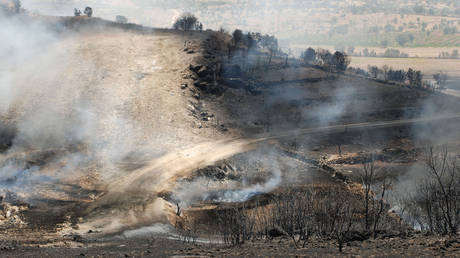
A blast in southeast Turkey prompted the closure of a major oil pipeline
A Turkish state-run petroleum firm has cut off the flow of oil from the Kirkuk-Ceyhan pipeline following a mysterious explosion and the resulting blaze, with the aftermath reportedly caught in images circulating online.
The explosion rocked a section of the pipeline in Turkey’s southeastern province of Kahramanmaras on Tuesday night, about 108 miles (175 kilometers) from the line’s terminal in Ceyhan, the BOTAS Petroleum Pipeline Corporation said in a statement. The cause of the blast remains unclear.
“There was an explosion for an unknown reason, and a fire occurred as a result. The oil flow was immediately stopped by BOTAS teams and technical safety measures were taken,” the firm said, adding “the line valves closest to the scene were closed” and that “many fire trucks, emergency response teams and related units are intervening.”
Photos and videos making the rounds on social media purported to show the flames following the blast, with thick clouds of black smoke seen billowing over the horizon as first responders poured into the area.
The mayor of Kahramanmaras city, Hayrettin Gungor, told local media that the incident did not result in any casualties, while provincial governor Omer Fauk Coskun noted that the damage was contained, saying the fire did not spread to nearby residential areas.
After about two hours, BOTAS announced that the flames had been “completely extinguished,” adding that the pipeline would be “put back into operation as soon as possible after the necessary measures are taken.”
READ MORE: Ruptured pipeline kills thousands of animals
The Kirkuk-Ceyhan pipeline stretches for some 600 miles (970 kilometers) between Ceyhan, Turkey and Kirkuk, Iraq, and is the latter country’s largest crude oil export line. It has come under repeated attack by militants over the years, including suspected sabotage by the Islamic State (IS, formerly ISIS) terrorists as well as fighters with the Kurdistan Workers’ Party (PKK), prompting intermittent closures on the Iraqi side.




